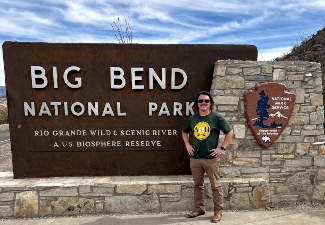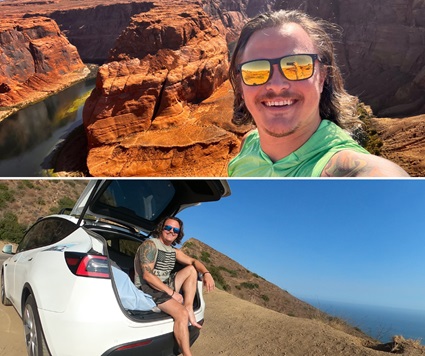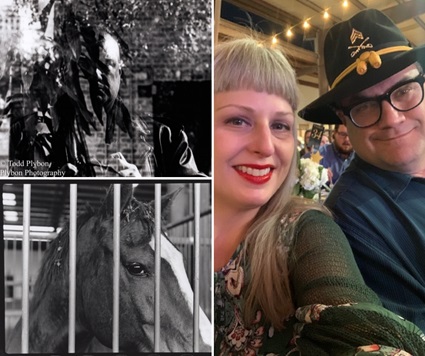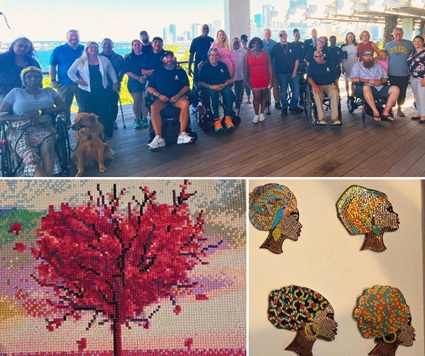Healing is in the Eye of the Beholder
Wounded Warrior Project Supports Veterans Living with Brain Injuries and Illnesses
Dylan Sims enjoys each day being different. He might be working on poetry, or his novel, or even a comedy he is drafting. Dylan joined the Army National Guard in 2013 to serve his nation. He deployed to Kuwait and then Iraq.

Head and hip injuries cut his military career short in 2016. Just five years later, at the age of 29, a rare diagnosis of early-onset dementia upended his life. Dementia is most typical in patients over age 65. Early-onset dementia typically impacts individuals in their 40s or 50s.
Dementia causes cognitive changes, including memory loss, problems communicating, confusion, and disorientation. The symptoms worsen over time.
Dylan decided to leave his civilian job and live his life.
“I quit my job a few months after my diagnosis,” Dylan said. “I hit the road to see the country, meet people, and make memories while I still could.”
Dylan rolled down Route 66, slept near San Francisco, recharged in Chicago, and napped near Niagara Falls. He traveled thousands of miles, camped in his electric vehicle, and made many memories.
Dylan had a passenger along that journey – Wounded Warrior Project® (WWP). The veterans charity provides personalized services to our nation’s most severely wounded service members – individuals with spinal cord injuries, moderate to severe traumatic brain injuries, and neurological conditions.

While Dylan was traveling the country, WWP™ offered support and opportunities to connect with other veterans. Now, WWP connects Dylan with other resources to provide him educational material to better understand his diagnosis and tools/exercises he can do to improve his quality of life.
WWP helped Dylan attend the SHARE Military Initiative at Shepherd Center in Atlanta. The program provides brain and spinal injury rehabilitation through inpatient and outpatient opportunities. WWP and Shepherd Center have collaborated over the years to increase access to care for wounded veterans.
For Dylan, the opportunity at Shepherd Center opened new doors. Doctors he previously saw told him he needed to stimulate his mind but did not provide ways to accomplish that.
“Shepherd Center taught me exercises to make things better and more manageable,” Dylan said. “It taught me ways to activate my brain.”
Dylan graduated from Shepherd Center in summer 2023, but staff check in on him regularly. He still uses the exercises to stimulate his brain. For example, through programs at WWP, Dylan started writing. He completed expressive writing sessions as a form of therapy and participated in a men’s writing group. He also shared his poetry through a virtual open mic event offered by WWP.
A Different Lens on Healing

WWP empowers veterans to live their lives as independently as possible. Army National Guard veteran Todd Plybon found healing through the click of a camera. Photography helps provide a moment of clarity and comfort for Todd.
Before serving our nation, Todd taught physics and chemistry. Then he deployed to Iraq and Afghanistan, serving in harm's way daily. On his latter deployment, an improvised explosive device tore apart the vehicle he was in. Todd was tossed from the vehicle and crushed underneath part of the Humvee. His team found him and saved his life on the side of an Afghanistan road. He was flown to Landstuhl Medical Center before being transported back to a stateside hospital.
Along with broken bones and nearly losing his right leg, Todd survived a traumatic brain injury (TBI). The TBI keeps him from returning to work.
“I tried working in a lab, but I had trouble remembering regular procedures,” Todd said.
With support from WWP’s Independence Program, he can focus on his photography. A recreational therapist takes Todd around to see his community through his camera lens.
“He captures the beauty in disarray,” Todd’s wife Tara said. “He looks at things and captures them from an angle I never would have considered. He takes his observation skills from being a chemist and a soldier and applies those to his photography.”
She sees how photography is so beneficial.
“When he is in the viewfinder, he lets go of some of his hyper-vigilance that he deals with.”
WWP also paid for Todd to learn to use a dark room to develop what he captures, creating another way to help his healing.
“When I’m in the dark room, it’s just me,” Todd said. “I try to block out everything and focus on what I am doing, so it provides some peace.”
Along with photography, WWP provides equine therapy for Todd. Working with horses helps restore a part of Todd that had been missing.
“Nobody looks to me for leadership anymore,” Todd said. “When you are with the horses, they need a leader. You have to gain their trust, but once you have that, you are granted that ability to lead again.”
Healing with the Stroke of a Brush
Army veteran Robin Young finds her healing with a brush in her hand. Robin experienced a TBI while deployed to the Middle East. She suffered heat stroke and her brain lacked oxygen for too long.

Robin faced rigorous rehab when she returned home. But she didn’t do it alone. She connected with WWP and its Independence Program. One part of the personalized support has been art therapy. Robin has grown through it.
“I went from drawing stick people to creating art,” she said.
She had the chance recently to display her work at the Perez Art Museum in Miami during a WWP Independence Program exhibit.
“To have people come and look at my art and admire it, it makes me so proud.”
Robin learned quickly there is more to this support than just painting.
“I used to think art therapy was just about creating art, but we go through so much more, including breathing techniques that help keep me calm.”
Her favorite is painting flowers where she uses assorted colors to express how she is feeling: bright colors when she is happy, oranges and reds when she is mad, and darker colors when she is sad.
Robin is one of a few warriors supported through WWP’s Independence Program who will have art displayed at Dallas Love Field from March through May 2024. It is the second consecutive year Robin’s art will be on exhibit at the airport, along with creations from other warriors in the Independence Program.
Alternative therapies help stimulate the brain and provide an outlet for wounded veterans. Painting, photography, and creative writing are just three ways Wounded Warrior Project helps veterans navigate life with a brain injury or illness.
Learn about how Wounded Warrior Project's Independence Program helps.
Contact: — Rob Louis, Public Relations, rlouis@woundedwarriorproject.org, 904.627.0432
About Wounded Warrior Project
Since 2003, Wounded Warrior Project® (WWP) has been meeting the growing needs of warriors, their families, and caregivers — helping them achieve their highest ambition. Learn more.